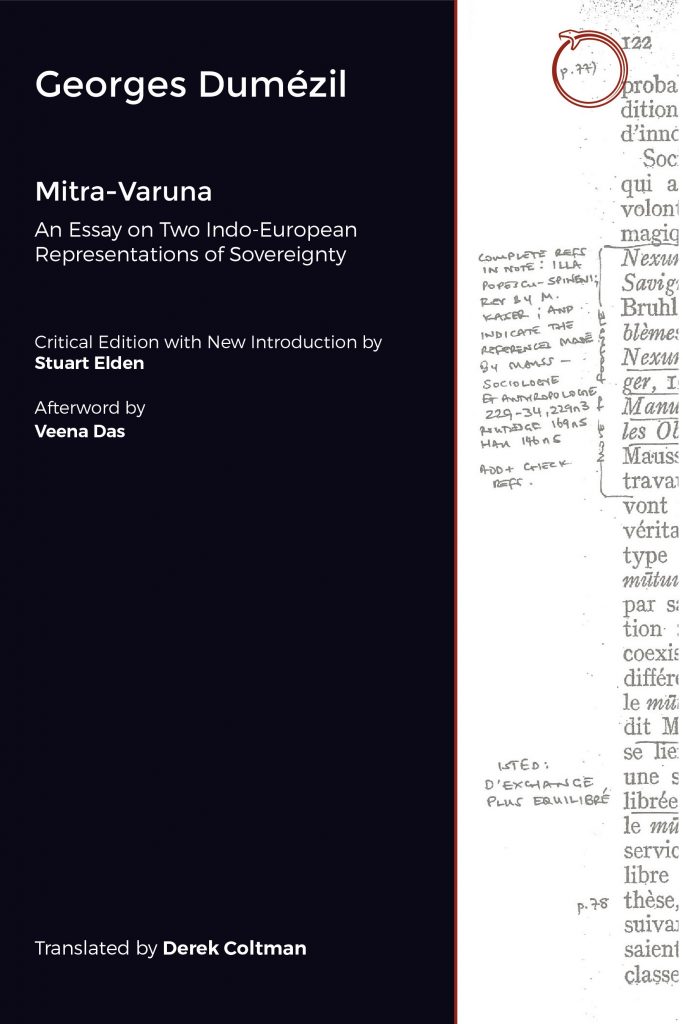An Essay on Two Indo-European Representations of Sovereignty
By Georges Dumézil
Critical Edition with a New Introduction by Stuart Elden
Afterword by Veena Das
Translated by Derek Coltman
Georges Dumézil’s fascination with the myths and histories of India, Rome, Scandinavia, and the Celts yielded an idea that became his most influential scholarly legacy: the tripartite hypothesis, which divides Indo-European societal functions into three classes: the sacred sovereign, the warrior, and the producer. Mitra-Varuna, originally published in 1940, concentrates on the first function, that of sovereignty. Dumézil identifies two types of rulers, the first judicial and worldly, the second divine and supernatural. These figures, both priestly, are oppositional but complementary. The title nods to these roles, referring to the gods Mitra, a rational mediator, and Varuna, an awesome religious figure.
Stuart Elden’s critical edition, based on the 1988 English translation by Derek Coltman, identifies variations between the first and second French editions and completes—and in places corrects—Dumézil’s references. The editor’s detailed introduction situates Mitra-Varuna within Dumézil’s career, outlines how his treatment of its themes developed over time, and relates the book to the political controversy around his ideas. Two new appendices contain passages that did not appear in the second French edition.
“If anthropology has any conceit that it is hospitable to other modes of thought and their salience for ‘provincializing Europe,’ the texts we allow into the canon must be raked for their potential for the future they might have as much as for their past. My discussion is heavily oriented to the Indian texts that I know best, but Dumézil shows us that the relevance of these texts is not confined to the local.”
— Veena Das, Afterword: “Mitra-Varuna: The Ongoing Life of a Concept”
“While Mitra-Varuna is a study of the first function of sovereignty, this is not to say it is a simple analysis of a unified god across different traditions. Importantly Dumézil also recognises that the divide does not cut simply three ways, but the first function, concerning sovereignty, is itself split. Thus in analysing the role of Varuna, Mitra also needs to be considered; if Jupiter is examined, then Dius Fidius, the god of oaths, must also be questioned. Sovereignty is, in this analysis, divided between a more legal, contractual, reasoning side and a terrible, magical, and warlike basis. As Dumézil says at one point in the book, ‘Mitra is the sovereign under his reasoning aspect, luminous, ordered, calm, benevolent, priestly; Varuna is the sovereign under his attacking aspect, dark, inspired, violent, terrible, warlike.’ How this split in the first function might operate, with similarities and differences between traditions, is the focus of the present book.”
— Stuart Elden, Introduction: “Mitra-Varuna: A Re-Introduction to Georges Dumézil”
Georges Dumézil (1898–1986) was a philologist, linguist, and religious studies scholar best known for his work in comparative mythology. A member of the Académie Française, he taught at Istanbul University, the École Pratique des Hautes Études, and the Collège de France.
Stuart Elden is a Professor of Political Theory and Geography at the University of Warwick, UK. He is the author of several books, including Terror and Territory: The Spatial Extent of Sovereignty (2009) and a four-volume intellectual history of Michel Foucault’s entire career (2016, 2017, 2021, 2023).
Veena Das is a Research Professor of Anthropology at Johns Hopkins University. Among her many publications are Life and Words: Violence and the Descent into the Ordinary (2006), Textures of the Ordinary: Doing Anthropology After Wittgenstein (2020), and Slum Acts (2021).
© 2023 HAU Books, Critical edition
© 1940 Presses Universitaires de France, first edition
© 1948 Éditions Gallimard, second edition
© 1988 Zone Books, English translation
ISBN: 9781912808977 [paperback]
ISBN: 9781912808991 [e-book]
6″ x 9″, 236 pp.
$25 | £20 | €23 | AUD $42
Released December 2024
Contents
A Note to Our Readers: Exceptionally, we were unable to secure open-access translation rights for this book, and therefore no open-access funding was available. However, the full book will be made freely available here. If you can purchase a copy, your support will help recover the upfront costs that made this critical edition possible. Every purchase directly contributes to our ability to continue making important scholarly works available to wider audiences. Thank you for your support!
Notice to Readers of the Electronic Edition: All rights reserved. No part of this publication may be reproduced, distributed, or transmitted in any form or by any means without the prior written permission of the publisher, except for brief quotations in reviews or other noncommercial uses permitted by copyright law. Access to the Electronic edition is for private use only. Any violation of these conditions constitutes an infringement of copyright law and the rights of the Proprietor, Author, and Publisher.
